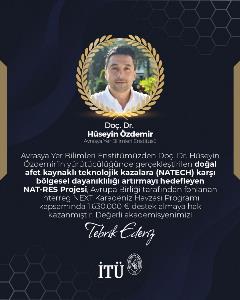EU Awards Grant to ITU Member
The project proposed by Assoc. Prof. Dr. Hüseyin Özdemir, a faculty member at the Eurasia Institute of Earth Sciences, has been awarded funding from the European Union under the Interreg NEXT Black Sea Basin Programme. The consortium, coordinated by Istanbul Technical University (ITU), includes the Istanbul Provincial Disaster and Emergency Directorate, the Region of Eastern Macedonia and Thrace (PAMTH-Greece), and the Ukrainian Association of Business Support Centers (UABSC-Ukraine). The project, titled “NATECH Resilience Initiative in the Black Sea Region (NAT-RES)”, will be supported for a duration of 24 months with a total budget of EUR 1,636,586. Within this total budget, ITU's share is EUR 554,302.
Reducing NATECH Risks in the Black Sea Region
The NAT-RES project will focus on addressing the critical challenges in managing NATECH (Natural Hazard Triggering Technological Disasters) events, where natural disasters such as earthquakes and floods can trigger technological accidents, leading to serious consequences for human health, environmental safety, and regional stability. The interaction between natural and technological hazards creates complex, cascading risks that are difficult to predict and manage. Devastating seismic activity such as earthquakes and sudden floods intensified by climate change can disrupt industrial operations and lead to technological accidents. The presence of industrial facilities in hazard-prone areas, including chemical plants, oil refineries, power stations, and transportation networks, further increases the possibility of NATECH events.
The project will integrate advanced technological solutions, comprehensive hazard mapping, and risk assessment methodologies aimed at minimizing adverse environmental impacts and strengthening the resilience of communities in the region. As part of the project, the enhanced AFAD-EKA software, designed to address specific NATECH risks in the region, is expected to be implemented alongside real-time monitoring systems and automatic shutdown mechanisms in industrial facilities. These applications will lead to significant improvements in early warning systems. As a result, the project will provide a model that incorporates best practices in NATECH risk management, demonstrating the effectiveness of integrated technological and environmentally friendly solutions in reducing disaster impacts and improving emergency response times. As the lead partner of the project, ITU will take the lead in technical and scientific areas, including the development of hazard maps, risk assessment methodologies, and training programs.
The expected outcome of the project is a significant improvement in the region’s capacity to anticipate, respond to, and mitigate the impacts of NATECH events. This will enable local authorities and industrial plants to better prepare for such events, enhance public awareness, and support the development of more robust disaster response strategies. Ultimately, the risks and impacts of NATECH incidents on human health, environmental safety, and regional stability will be reduced. The project also aims to establish a cross-border cooperation network, facilitate data sharing, and organize joint training programs. Cross-border NATECH risk drills, hosted by the project partners, will contribute to strengthening preparedness and response capacities across the region.
